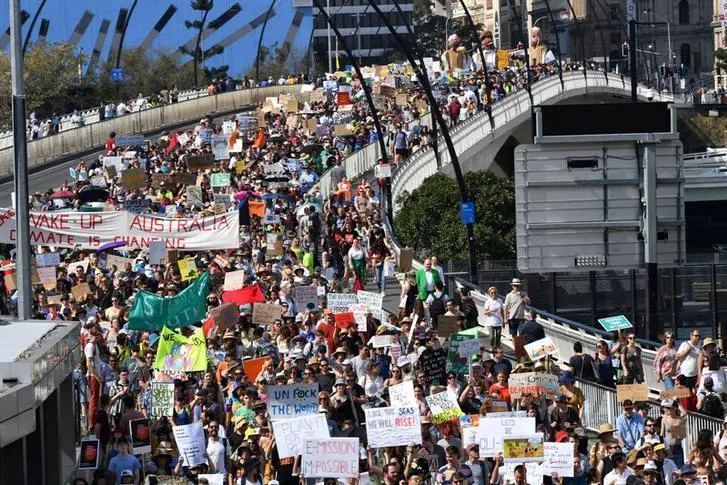PHOTO
NEW YORK (Reuters Breakingviews) - The streets of Melbourne, Australia were packed on Friday. Perhaps 1.6 million people downed tools and textbooks in Germany, according to early estimates. All in, almost 5,000 strikes and marches in 139 countries had been planned to call for more action to combat global warming, the 16-year-old Swedish activist Greta Thunberg tweeted on Thursday.
Friday’s mass demonstrations mark a stunning success for a campaign that started with Thunberg holding a cardboard sign outside her school a little over a year ago. Nothing fundamental has changed about the science of climate change in that time.
Many ways to enable the climate fight already exist. In the financial markets, green bonds and debt linked to the United Nations’ sustainable development goals are becoming more popular. Banks like ING have introduced loans and derivatives whose rates and fees increase if borrowers miss climate goals. There’s a proliferation of environmentally focused exchange-traded funds, and the ratings infrastructure that goes along with them, aiming to offer greener investments products to individuals. And investors have scored some notable successes engaging with companies to reduce their greenhouse-gas emissions, as a 340-firm shareholder consortium with $34 trillion or so in assets persuaded the likes of Royal Dutch Shell, Glencore and BP to up their game.
Trouble is, much of this seems piecemeal compared to the overall challenge. The investor group, called the Climate Action 100+, has only gone after relatively low-hanging fruit; the agreement with BP for example, doesn’t reduce oil production, just caps emissions as a percentage of output. Green bonds, meanwhile, accounted for only 2.5% of overall annual new bond sales in 2018, using data from the Climate Bonds Initiative and Dealogic.
Inertia, disbelief and cost play a role. So does a lack of urgency. The sudden aversion to plastic straws, bags and the like over the past two years shows just how quickly sentiment can change. The popularity of Friday’s strikes sends a signal to business that consumers care about climate change – and may prefer greener products. More importantly, it gives cover to politicians to propose taking tougher action like imposing carbon taxes without immediately fearing they’ll be ousted at the polls. That’s a powerful message.
CONTEXT NEWS
- People around the world are taking part in marches and strikes on Sept. 20 in support of tackling climate change. The events have been inspired by Greta Thunberg, the 16-year-old Swede who started a school strike for stronger action against climate change last year. As of Sept. 19 at least 4,638 events in 139 countries had been planned, Thunberg posted on Twitter.
- The United Nations is hosting a climate action summit in New York on Sept. 23.
(Editing by Robert Cyran and Leigh Anderson)
© Reuters News 2019





















